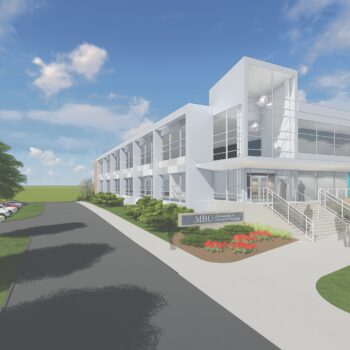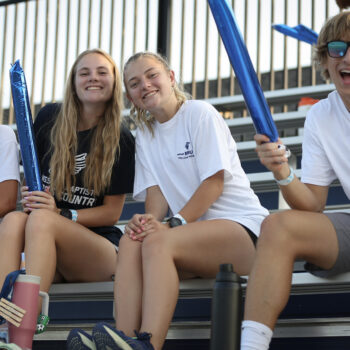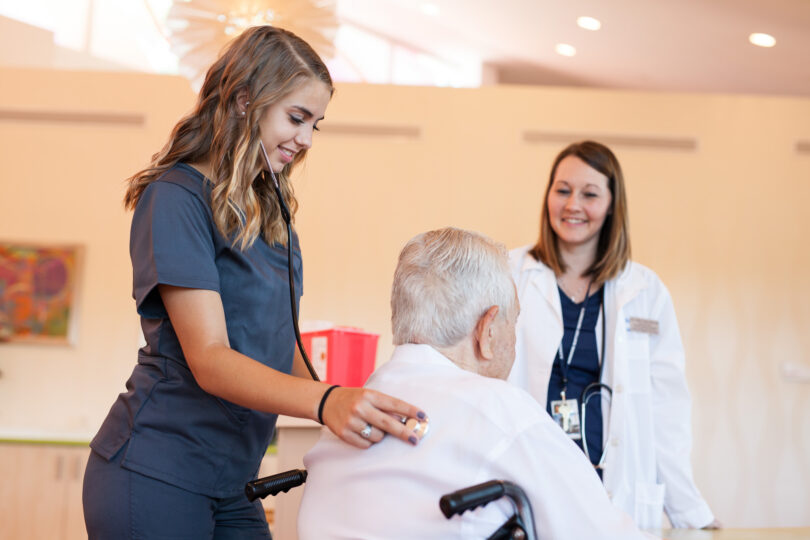Courses for the BSN are taught in MBU’s state-of-the-art School of Nursing, located in the Walker Medical Building neighboring MBU’s main campus. The 8,000-plus square feet space has been transformed into an innovative learning space, which includes a simulation lab, technology-equipped training classrooms, and community meeting areas.
MBU School of Nursing also offers a Nursing Across Culture minor.
Why MBU?
- As the only evangelical Christian University in St. Louis, MBU’s program fills an important role in St. Louis and beyond as it aims to intersect innovative preparation with Christian perspectives, integrating personal faith in the practice of nursing while serving in a global and culturally diverse society.
- You’ll learn in an environment built specifically to prepare you to be successful in the ever-changing nursing industry. MBU’s School of Nursing is located in the Walker Medical Building, which neighbors MBU’s main campus. The 8,000-plus square feet space was transformed into an innovative learning space, which includes a simulation lab, technology-equipped training classrooms, and community meeting areas. View the gallery here.
- All students admitted into this program within the School of Nursing will receive a new laptop included in tuition to help foster innovative learning. At MBU, you’ll use technology to learn how to communicate relevant patient data, manage care, mitigate errors, and support clinical judgment and evidence-based nursing practice.
- The launch of MBU’s nursing program comes when the demand for registered nurses who have earned a BSN is high. In Missouri, employment of registered nurses is projected to grow more than 13 percent by 2024, according to Missouri’s Division of Employment Security. The projections are, in part, based on the rising demand for healthcare confounded with a significant number of nurses who will be retiring in the next decade.
FAQ
1. Are there any part-time or online options available for the BSN program? No, the BSN program is a full-time program. There are no online options for completion of the BSN.
2. Do all of the prerequisite courses need to be completed before starting the core nursing courses in my third year? Applicants should have completed all pre-nursing requirements (or be currently enrolled) prior to beginning the core nursing courses in their third year. Students who have up to nine (9) credit hours of pre-nursing courses outstanding may start the core nursing courses if the courses can be taken during a summer semester or in an online format during the nursing program. All science and math courses must be completed prior to starting the nursing program.
The following prerequisite grades must be earned to begin core nursing courses:
- Anatomy & Physiology I w/lab (must earn a B or better in theory & lab)
- Anatomy & Physiology II w/lab (must earn a B or better in theory & lab)
- Pathophysiology (must earn a B or better)
- Microbiology w/lab (must earn a B or better in theory & lab)
The science courses must be completed within the past 7 years.
3. How can I apply? Complete the undergraduate application to MBU and note your interest in the nursing program. Your admissions counselor will work with you on the details.
4. Can I be a student-athlete while enrolled in the nursing program? Yes, we’ve had many successful student-athletes graduate from the program. The key is maintaining direct communication with your nursing professors.
5. How many clinical hours will I have during the BSN program? Students completing the BSN program complete 765 hours of clinical practice in a variety of specialty areas. The program concludes with a 168-hour Senior Capstone experience where the student works with a preceptor to increase knowledge application, prioritization and decision-making skills as well as help facilitate a smooth transition to professional practice.
6. Are there opportunities to work with diverse populations during the BSN program? Each student will have a number of opportunities to work with diverse populations during the course of study.
7. When do clinical experiences begin in the BSN program at Missouri Baptist University School of Nursing? Students in the BSN program begin clinical in their first semester and continue in clinical synthesis experiences throughout the program.
8. Where are clinical courses? Clinical courses may be held anywhere within a 75-mile radius of the campus. Students are responsible for transportation to and from clinical sites. Clinical experiences may be eight-hour or twelve-hour shifts. The usual start time is 6:30 a.m., although there could be some night shift hours during senior capstone.
9. Is there a time limit on when courses had to be completed in order for them to be transferred in to the School of Nursing? Yes, there is a 7 year time limit on four science courses. Students must have completed the following courses in the past 7 years in order to transfer them in to the School of Nursing.
- Anatomy & Physiology I & II
- Pathophysiology
- Microbiology
10. Is this program accredited?
- The School of Nursing has been granted full approval by the Missouri State Board of Nursing, 3605 Missouri Blvd, PO BOX 656, Jefferson City, MO 65102.
- The Missouri Baptist University Bachelor’s and Master’s Degree in Nursing Program is accredited by the National League for Nursing Commission for Nursing Education Accreditation (NLN CNEA) located at 2600 Virginia Avenue, NW, Washington, DC 20037. 202-909-2487.
Clinical Sites
The School of Nursing at Missouri Baptist University will use a variety of clinical sites to give students a broad range of experiences across various settings and with different populations. Our list of clinical sites is continually growing. Below is an example of some of the sites that students could attend.
- BJC Healthcare
- Mercy Jefferson
- Mercy South
- Mercy St. Louis
- Mercy Washington
- Mid-America Transplant
- Ranken Jordan Pediatric Rehabilitation Hospital
- SSM Health
- St. Luke’s Hospital
Admission Requirements
• Minimum High School GPA: 3.0
• Admission Policy Details
*Transfer students can be considered on a case-by-case basis.


